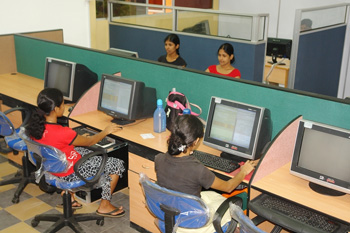Business Process Outsourcing companies or BPOs may prove to be the new model for success for Sri Lankan villagers, according to rural BPO pioneer OnTime Technologies. Growing from three employees to 10 since launching in operations in March 2007, the company indicates that it has surmounted what it considers to be the 'main hurdle' for this type of venture, problems "[matching] rural youths with corporate business culture". This according to Chief Executive Officer, Nirosh Ranathunga. A true rural enterprise, all OnTime staff, including Mr. Ranathunga, is based out of the village of Mahavilachchiya in Anuradhapura.
In fact, again according to Mr. Ranathunga, the very reasoning which culminated in their favouring a BPO startup over more traditional pursuits, such as farming, textiles, etc, still holds true even in today's turbulent business evnvironment -- pointing to the fact that recruits only need a minimum educational qualification, can be easily trained, and require very simple technology to maintain operations.
 |
OnTime's business model seems to be a testimony to the benefits of simplicity, which, in turn, has elicited the company a virtually unlimited degree of expandability. As such, OnTime's performance has shown it has what it takes to remain strong no matter the business environment, with the company further indicating an urgency to keep going through its recent acquisitions of more operators, its efforts to further enhance productivity and its plans to approach new clients, all at a time when many companies the world over are winding down rather than ramping up operations. Since OnTime is an employee-owned company, the rewards of growth are even sweeter for staff as they directly benefit when share capital and profitability increases.
Meanwhile, another benefit to villagers of having BPO companies based in their immediate vicinity, according to John Keells Holdings Director, Sumithra Gunesekera, is that “youth do not have to leave their families and communities and travel to urban areas in search of jobs. This eliminates the immense hardship, additional expenses and other social problems they have to face in urban migration. This also enables them to save more money.”
However, it is important to note that existing capabilities across rural Sri Lanka do not currently favour many initiatives such as OnTime Technologies. Says Mr. Gunesekara, the "village of Mahavilachchiya was selected for this pilot as it had the highest density of computers of any village in the country. Also, thanks to the pioneering work of Nandasiri Wanninayake and his Horizon Academy, Mahavilachchiya boasted of a comparatively large number of youth with basic IT and English skills".
In addition, OnTime was helped by a very powerful corporate benefactor who paved the way for "IT units of InfoMate and John Keells Strategic Group IT [combining] to create a revolutionary IT model wherein secure [Virtual Private Network] access was extended to Mahavilachchiya. Initial training, too was provided to OnTime staff by InfoMate in its premises in Colombo, whilst facilitating accommodation, meals and travelling", adds Mr. Gunesekara. Factors that potentially indicate a lack of resources being readily available to most villagers. But, either way, there is no doubt in anyone's mind that OnTime's successes past and present has provided a beacon of opportnuity to all Sri Lankans.
It will also be interesting to watch OnTime's progress in the near term because, although the company claims that the recent global economic downturn has not negatively impacted its bottom line, this may be largely explained due to OnTime's status as 'an extended arm of InfoMate Private Limited (a subsidiary of John Keells Holdings PLC) [which] carries out transaction processing, as an extension of InfoMate’s role of captive finance and accounting service provider for the John Keells Group', a relationship that may suggest OnTime has so far not had to face serious 'hurdles' since the integration issues alluded at its startup stage. |

